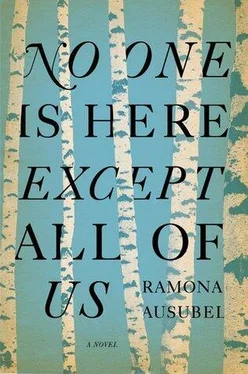I shut my eyes again, and let my head roll back.
The farmer’s hands, one on my shoulder and the other on my leg, felt huge. I could already tell the tips of his fingers would leave bruises. But was this because he pushed them down hard? No, my own weight was to blame, crushing itself into those gentle pink pads. The farmer carried me to a bed made on the floor, where he lit and then blew out a candle. Solomon climbed in next to me. The wife pulled the wool up to the necks of her strangers. The journey from the floor near the table to the floor on the other side of the room was no more than a few paces, nothing like the hundreds of miles we had come. Yet in these last yards, a border had been crossed. The farmer had carried me like his innocent bride over the threshold. I listened to the fire spark and whine until it died and the coals left only the faintest halo of light for me to pray by.
In the next days, Solomon learned how to stack wood, churn butter and dig up only those potatoes whose bushes had begun to wither. I was given socks to mend by the farmer’s wife. Her face looked like it was made of dough that had risen. Her lips puffed out around her teeth when she smiled, and enclosed them like a well-packed crate of eggs when she stopped. The farmer did not like to talk, at least not to me. He surveyed me and measured my son, like a banker wondering over an investment. His eyes were milky and his beard thin. “He’s nothing like what I would have expected. He’s a natural outdoorsman,” the farmer said, bragging like a father. I could not think of something to glory about that would make sense to someone who had lived on the solid earth all along. My son is a natural constellation maker, a natural escaper, a natural mourner.
I ate and slept and our hosts knew by watching that these acts were as much as I could bear. Meanwhile, my son got himself back. It happened so fast. His legs were legs again, rejoined by the hopeful wrap of muscle. His hands were not a web of bone anymore. His feet. His toes. His spine — all of them were covered by a thin layer of new flesh. I still felt weak and wrung-out. My body did not build itself back up so quickly. I stared at myself in the mirror hanging beside the washbasin. “You’re me,” I said to it. “Hello.” I waved and the person waved back. “I almost remember you. Remember me?” The woman repeated it with me, not waiting until I was done with the question to ask it back.
“Remember me?”
“Remember me?”
“Remember me?”
I watched my son out the window with the farmer, gathering, separating, hulling and seeding barley. They sat on stumps and worked. They walked and worked. They came inside, put their feet up and talked about the work that was done. They scrubbed the potatoes and they brought eggs inside, fed the chickens. There were some early apples, small and bumpy. Solomon liked to suck on them and let the sour juice sting his mouth.
As the weeks passed, my jealousy bubbled over. I imagined that Solomon and I were alone in a field somewhere, telling each other the story of what once was. His skeleton arms, his skeleton legs mine alone to hold on to, to provide just enough for, to love. I had taught him to be adaptable, to put his hands up and catch, like a tree, whatever moisture blew past. And I had knocked on this door. All Solomon had done was not say no. I missed him now in this foreign house. I missed being alone with him.
The farmer’s wife had Solomon help bake the bread. She had him churning and boiling. She gave him candies to suck on and bread to eat between meals. He liked what he was asked to do — he liked working for the sake of something.
Each time the farmer saw me, disappointment scribbled over his eyes. He seemed to be patiently waiting for the day when I would quietly and respectfully disappear. I moved less and less. The farmer ignored me more and more. The farmer’s wife gave me things to chop, which took me all day. Three potatoes were hours of work, slicing them in half was enough. Cutting their starchy bodies, cutting them again. The farmer’s wife worked quickly, gathering everything together and cooking it.
“We used to be three,” I said, my knife resting at the edge of the board.
“Your husband?”
“If you count him we used to be four.”
“Your husband and who else?”
“The baby. He was Solomon’s little brother.”
“Your son?”
The farmer’s wife came and put her hand on my head. She brushed the hair that fell there. “Did they kill them, your husband and your baby?”
“My son fell asleep and did not wake up again.” Out the window: everything else. It looked like home to me sometimes, the big emptiness of it, the unknown.
“And your husband?”
I explained Igor’s kidnapping, how he was the only one taken and no one knew why or what it meant. Chosen like an egg out of a basket.
“Was that the end of it?”
“We left that night. I have no idea if our village has been burned up or if it’s the same as always. No one knows where I am. Even I don’t know where I am.”
“That is…” the farmer’s wife began, but she never told me what.
A few days later, the farmer came home from a trip to town with a newspaper curled under his arm. I saw it and the air fell out of my body. That there might be a fact, a truth about where I was and whether I had been in danger at all. Whether I had lost my son for a reason. Whether I had starved us all for a reason. Whether the winter would come again and trees would hang themselves over me while the stones made pits of my back.
The farmer did not open the newspaper up. He put down a brick of cheese, a wreath of garlic, some meat wrapped in paper, blood seeping through.
“You have a newspaper,” I said.
The farmer did not answer me.
“You bought a newspaper in town,” I said.
The farmer did not answer me.
“Does that newspaper tell us how we might die?” I asked.
The farmer looked at me. His eyes were sorrowful holes in his head. His cheeks were hot red from walking and the wind had mangled his hair. He smoothed it down. “Not how I will die,” he said, finally. For a second, punishment flashed in his eyes. My punishment. Truth shining like a weapon in his hands.
“You don’t have to read it if you don’t want to,” the farmer’s wife told me.
“I thought you might feel better knowing,” he said, his words hot enough to burn.
He put it down, opened it flat. The picture was of a temple, exploded. A symbol like a bent cross was laid over the rubble, a flag. I imagined that he had written this paper especially for me. If I wanted to develop a theory of a crumbling world, he was going to prove it. Watch what thoughts your imagination conjures up, the farmer and his newspaper seemed to scold.
“It’s possible it will end soon,” the farmer’s wife said.
“End,” I repeated.
Solomon came in from outside, from running or rolling or building. He was alive and warm and his skin was washed with wind.
“Everything is fine,” I told him, taking the newspaper away. He smiled and nodded.
“I know,” he said, “everything is great.”
Silently, we set to work making and then serving dinner. I ate a piece of bread. The farmer asked Solomon what he had done in the afternoon and Solomon told him about the house he had built for a beetle out of sticks. He told about the windows and the door, the bug-sized trees he had planted around it. The soft grass bed and the hidden shelter behind it. He hoped to make a pond for the bug to swim in once it got warm enough, he said. If he made it nice enough, more bugs might come. Pretty soon a whole family, a whole village would be his to take care of.
In the dark, Solomon wrapped his leg around my leg. He hit me without knowing it or meaning it. He slept so soundly now, as soundly as his father ever had. He did not wake from a nightmare or from hunger or cold. Solomon was somewhere far away from me, his sleep a thick, safe net around him. I put my hand on his cheek and whispered, “Hello,” but he did not flicker. I felt like a firefly, dimming. Soon, I would be too dark to see anymore; the night and my small body the same color.
Читать дальше












